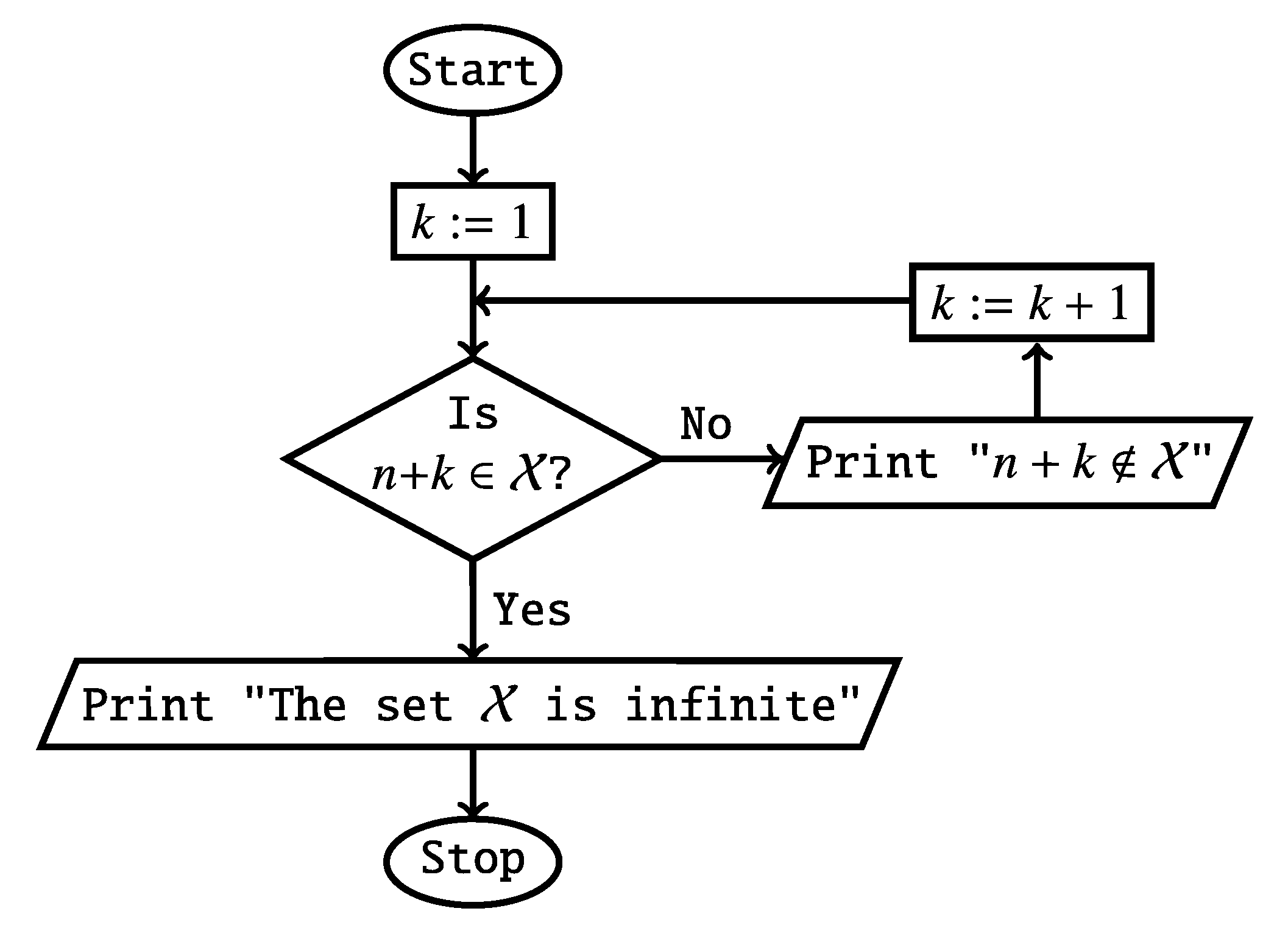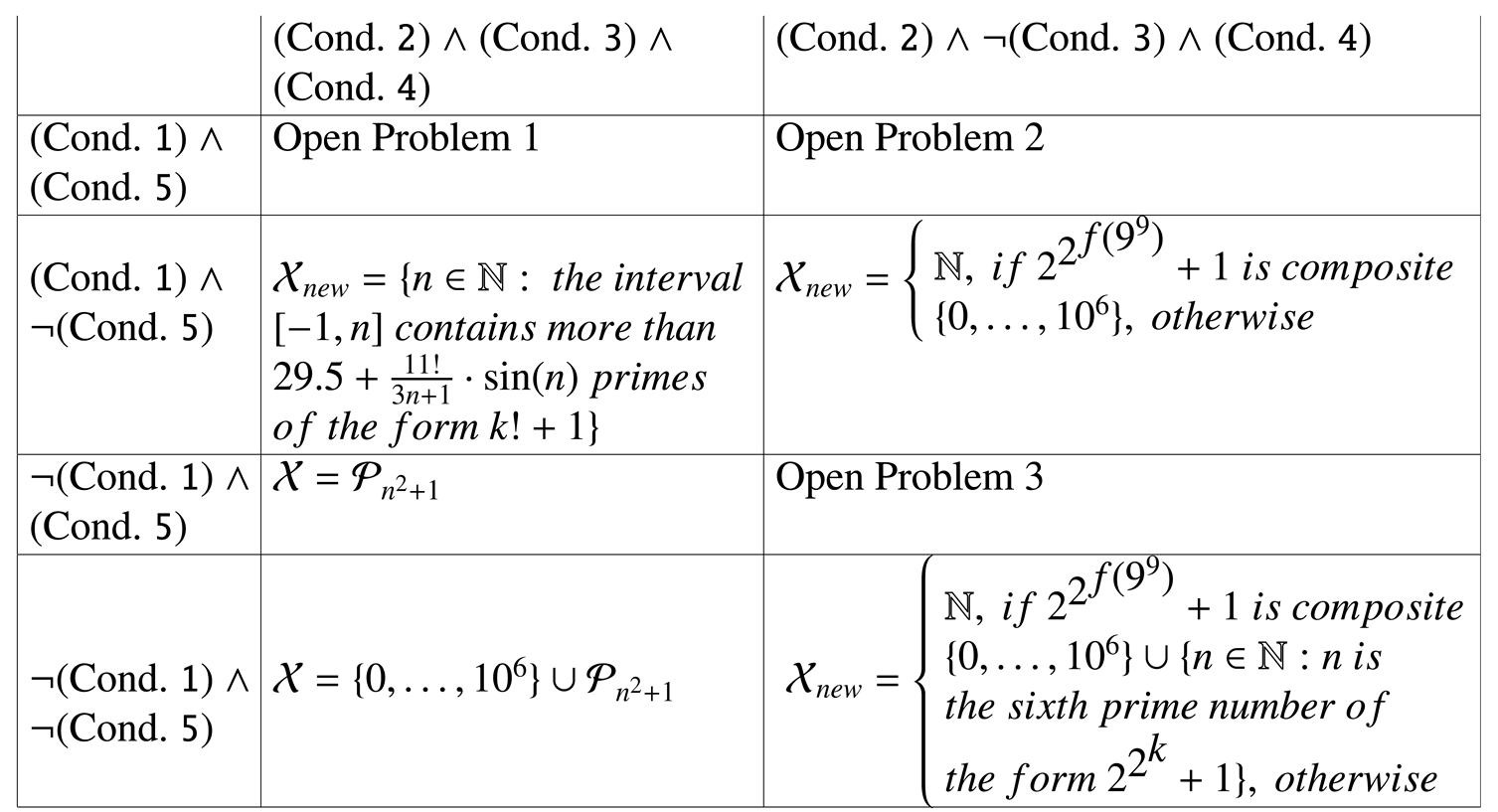2. Basic definitions and examples
Algorithms always terminate. Semi-algorithms may not terminate. There is the distinction between
existing algorithms (i.e. algorithms whose existence is provable in
) and
known algorithms (i.e. algorithms whose definition is constructive and currently known), see [
2,
10], [
12]. A definition of an integer
n is called
constructive, if it provides a known algorithm with no input that returns
n. Definition 1 applies to sets
whose infiniteness is false or unproven.
Definition 1. We say that a non-negative integer k is a known element of , if and we know an algebraic expression that defines k and consists of the following signs: 1 (one), + (addition), − (subtraction), · (multiplication), ^ (exponentiation with exponent in ), ! (factorial of a non-negative integer), ( (left parenthesis), ) (right parenthesis).
The set of known elements of is finite and time-dependent, so cannot be defined in the formal language of classical mathematics. Let t denote the largest twin prime that is smaller than ((((((((9!)!)!)!)!)!)!)!)!. The number t is an unknown element of the set of twin primes.
Definition 2.
Conditions(1)-(5)concern sets .
(1)A known algorithm with no input returns an integer n satisfying .
(2)A known algorithm for every decides whether or not .
(3)No known algorithm with no input returns the logical value of the statement .
(4)There are many elements of and it is conjectured, though so far unproven, that is infinite.
(5) is naturally defined. The infiniteness of is false or unproven. has the simplest definition among known sets with the same set of known elements.
Condition (3) implies that no known proof shows the finiteness/infiniteness of . No known set satisfies Conditions (1)-(4) and is widely known in number theory or naturally defined, where this term has only informal meaning.
Example 1.
The set satisfies Condition (3)
.
Let denote the integer part function.
Example 2.
The set
does not satisfy Condition (3)because we know an algorithm with no input that computes . The set of known elements of is empty. Hence, Condition(5)fails for .
Example 3.([2,10], [12][p. 9]). The function
is computable because or there exists such that
No known algorithm computes the function h.
Example 4.
The set
is decidable. This satisfies Conditions(1)and(3)and does not satisfy Conditions(2),(4), and(5). These facts will hold forever.
3. Main results
Edmund Landau’s conjecture states that the set
of primes of the form
is infinite, see [
13,
14,
17].
Statement 1. Condition (1) remains unproven for .
Proof. For every set
, there exists an algorithm
with no input that returns
This
n satisfies the implication in Condition
(1), but the algorithm
is unknown because its definition is ineffective. □
Statement 2.
The statement
remains unproven in and classical logic without the law of excluded middle.
Let
, and let
for every positive integer
n. The set
satisfies Conditions
(1)-(4). Condition
(5) fails for
.
Proof. Condition
(4) holds as
and the set
is conjecturally infinite. Due to known physics we are not able to confirm by a direct computation that some element of
is greater than
, see [
8]. Thus Condition
(3) holds. Condition
(2) holds trivially. Since the set
is empty or infinite, Condition
(1) holds with
. Condition
(5) fails as the set of known elements of
equals
. □
Statements 4 and 7 provide stronger examples. ([
1,
5]).
Conjecture 1. The are infinitely many primes of the form . For a non-negative integer n, let denote .
Statement 4.
The set
satisfies Conditions (1)-(5) except the requirement that is naturally defined. . Condition (1) holds with . . 30 .
Proof. For every integer
, 30 is the smallest integer greater than
. By this, if
, then
. Hence, Condition
(1) holds with
. We explicitly know 24 positive integers
k such that
is prime, see [
3]. The inequality
remains unproven. Since
, Condition
(3) holds. The interval
contains exactly three primes of the form
:
,
,
. For every integer
, the inequality
holds. Therefore, the execution of the following
MuPAD code
m:=0:
for n from 0.0 to 503000.0 do
if n<1!+1 then r:=0 end_if:
if n>=1!+1 and n<2!+1 then r:=1 end_if:
if n>=2!+1 and n<3!+1 then r:=2 end_if:
if n>=3!+1 then r:=3 end_if:
if r>29.5+(11!/(3*n+1))*sin(n) then
m:=m+1:
print([n,m]):
end_if:
end_for:
displays the all known elements of . The output ends with the line , which proves Condition (1) with and Condition (4) with . □
Definition 3.
Conditions(1a)-(5a)concern sets .
(1a)A known algorithm with no input returns an integer n satisfying .
(2a)A known algorithm for every decides whether or not .
(3a)No known algorithm with no input returns the logical value of the statement .
(4a)There are many elements of and it is conjectured, though so far unproven, that is finite.
(5a) is naturally defined. The finiteness of is false or unproven. has the simplest definition among known sets with the same set of known elements.
Statement 5.
The set
satisfies Conditions (1a)-(5a) except the requirement that is naturally defined. . Condition (1a) holds with . . 7 .
Proof. For every integer
, 7 is the smallest integer greater than
. By this, if
, then
. Hence, Condition
(1a) holds with
. It is conjectured that
is a square only for
, see [
16]. Hence, the inequality
remains unproven. Since
, Condition
(3a) holds. The interval
contains exactly three squares of the form
:
,
,
. Therefore, the execution of the following
MuPAD code
m:=0:
for n from 0.0 to 1000000.0 do
if n<25 then r:=0 end_if:
if n>=25 and n<121 then r:=1 end_if:
if n>=121 and n<5041 then r:=2 end_if:
if n>=5041 then r:=3 end_if:
if r>6.5+(1000000/(3*n+1))*sin(n) then
m:=m+1:
print([n,m]):
end_if:
end_for:
displays the all known elements of . The output ends with the line , which proves Condition (1a) with and Condition (4a) with . □
Statement 6.
The set
satisfies the conjunction
To formulate Statement 7 and its proof, we need some lemmas. For a non-negative integer n, let denote the largest integer divisor of smaller than n. For a non-negative integer n, let denote the largest integer divisor of smaller than n.
Lemma 1. For every integer , . For every integer , .
Lemma 2. For every integer , .
Proof. 6553600 equals
and divides
.
.
. We need to prove that every integer
does not divide
. It holds as the set
contains 6553600 and 7812500 as consecutive elements. □
Lemma 3. The number is prime.
Proof. The following
PARI/GP ([
9]) command
isprime(6553600^2+1,{flag=2})
returns 1. This command performs the
APRCL primality test, the best deterministic primality test algorithm ([
18]). It rigorously shows that the number
is prime. □
In the next lemmas, the execution of the command
isprime(n,{
flag=2}
) proves the primality of
n. Let
denote the function
Lemma 4. The set is infinite.
Proof. Let
. By the inequality
and Lemma 1, for every non-negative integer
m, the number
is prime. □
Before Open Problem
Section 3,
denotes the set
.
Lemma 5. For every and for every non-negative integer j, .
Proof. By the inequality
and Lemma 1,
□
Lemma 6. .
Proof. By Lemmas 2 and 3, for every even integer
, the number
is prime. Hence,
□
Lemma 7. and .
Proof. The number
divides
. Hence,
. The number
is prime. The set
contains 10000 and 12500 as consecutive elements. Hence,
. The number
is composite. □
Statement 7. The set satisfies Conditions (1)-(5) except the requirement that is naturally defined.
Proof. Condition (2) holds trivially. Let denote . By Lemma 5, Condition (1) holds for . Lemma 5 and the unproven statement show Condition (3). The same argument and Lemma 6 yield Condition (4). By Lemma 4, the set is infinite. Since Definition 1 applies to sets whose infiniteness is false or unproven, Condition (5) holds except the requirement that is naturally defined. □
The set satisfies Condition (5) except the requirement that is naturally defined. It is true because is infinite by Lemma 4 and Definition 1 applies only to sets whose infiniteness is false or unproven. Ignoring this restriction, still satisfies the same identical condition due to Lemma 7.
Rroposition 1.
No set will satisfy Conditions (1)-(4) forever, if for every algorithm with no input, at some future day, a computer will be able to execute this algorithm in 1 second or less.
Proof. The proof goes by contradiction. We fix an integer
n that satisfies Condition
(1). Since Conditions
(1)-(3) will hold forever, the semi-algorithm in Figure 1 never terminates and sequentially prints the following sentences:
The sentences from the sequence
(T) and our assumption imply that for every integer
computed by a known algorithm, at some future day, a computer will be able to confirm in 1 second or less that
. Thus, at some future day, numerical evidence will support the conjecture that the set
is finite, contrary to the conjecture in Condition
(4). □
The physical limits of computation ([
8]) disprove the assumption of Proposition 1
Openproblem 1. Is there a set which satisfies Conditions (1)-(5)?
Open Problem 1 asks about the existence of a year
in which the conjunction
will hold for some
. For every year
and for every
, a positive solution to Open Problem
i in the year
t may change in the future. Currently, the answers to Open Problems 1–5 are negative.
4. Satisfiable conjunctions which consist of Conditions (1)-(5) and their negations
The set
satisfies the conjunction
The set
satisfies the conjunction
The numbers
are prime for
. It is open whether or not there are infinitely many primes of the form
, see [
7] and [
11]. It is open whether or not there are infinitely many composite numbers of the form
, see [
7] and [
11]. Most mathematicians believe that
is composite for every integer
, see [
6].
The set
satisfies the conjunction
Openproblem 2.
Is there a set that satisfies the conjunction
The set
satisfies the conjunction
Is there a set
that satisfies the conjunction
It is possible, although very doubtful, that at some future day, the set will solve Open Problem 2. The same is true for Open Problem 3. It is possible, although very doubtful, that at some future day, the set will solve Open Problem 1. The same is true for Open Problems 2 and 3.
Table 1 shows satisfiable conjunctions of the form
where # denotes the negation ¬ or the absence of any symbol. Table 1 differs from Table 1 in [
15] for three sets
. These sets
have the index
.
Definition 4. We say that an integer n is a threshold number of a set , if .
If a set is empty or infinite, then any integer n is a threshold number of . If a set is non-empty and finite, then the all threshold numbers of form the set .
Openproblem 4. Is there a known threshold number of ?
Open Problem 4 asks about the existence of a year in which the implication will hold for some known integer n.
Let denote the set of twin primes.
Openproblem 4. Is there a known threshold number of ?
Open Problem 5 asks about the existence of a year in which the implication will hold for some known integer n.







